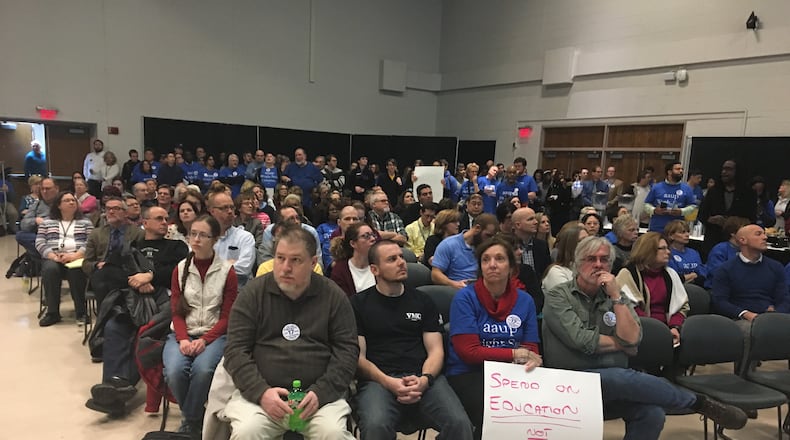“The fact that we got that percentage to vote and more than three quarters voted to authorize the strike is very telling,” said Martin Kich, union president and English professor at Wright State’s Lake Campus in Celina.
Kich could not give the exact number of union members who voted in favor of the strike.
» RELATED: Faculty strike could impact Wright State’s enrollment, finances
The possible strike comes after the WSU board of trustees decision to implement terms moves faculty union members into a “uniform” health care plan, maintains current rules of retrenchment, includes no pay raises and would allow faculty to be furloughed as part of “cost savings days.” In its strike notice, the union took issue with the furlough policy, changes to health care, new provisions for promotions and tenure appointment, workload and a merit pay system.
Wright State’s finances have contributed to trouble at the negotiating table. The university reduced its spending by around $53 million in fiscal year 2018 in an attempt to begin correcting years of overspending.
The last best offer implemented by the board was not a “negotiating tactic,” spokesman Seth Bauguess said in a prepared statement. The administration is “disappointed” the AAUP-WSU voted to authorize a strike, Bauguess said.
“The university has negotiated in good faith for nearly two years,” Bauguess said. “We have done everything in our power to avoid a strike, and provide our students with a high quality education.”
Despite the administration’s stance, WSU union leaders have said they have repeatedly reached out to president Cheryl Schrader to negotiate but have not gotten a response. Kich has said the board and administration have not negotiated with the union since early November.
» RELATED: What will trigger furloughs at WSU? New ‘cost savings’ policy explained
The union filed a complaint last week with the State Employment Relations Board accusing administrators of breaking collective bargaining ruled by negotiating in public, telling the news media about their “last, best offer” before telling the union, and failing to give the union requested information that was needed to continue negotiations.
The complaint states that prior to the “last, best offer” union leaders had sought more information from the administration related to areas that the union could be willing to make financial concessions, which “indicated clear intent of the AAUP-WSU to negotiate.”
The ongoing labor dispute brings to a head nearly two years of negotiations that ultimately failed earlier this month. Both sides have said they hoped to avoid a strike and union leaders have said a strike would be a “final straw.”
“Our faculty are standing together to uphold the principle that public education serves the public good,” Kich said. “We want to preserve faculty’s role in making decisions about the university.”
About the Author
